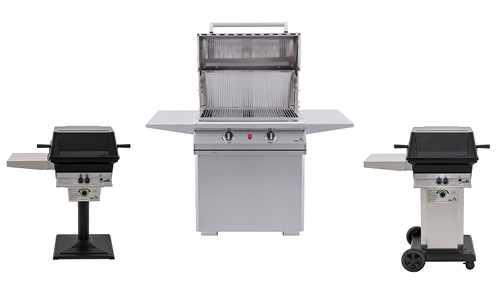Compare Natural Gas vs Propane vs Electric for Patio Grills
11 minute read
|
Grills
When it comes to choosing a patio grill, the type of fuel you use can significantly impact your experience in terms of convenience, installation, portability, and compliance with building codes. For contractors, developers, and property owners managing multi-family spaces like apartments or condos, understanding the differences between natural gas, propane, and electric grills is essential. In this post, we’ll break down the pros and cons of each option, helping you make an informed decision for your outdoor space. Natural gas grills are a popular choice due to their reliability and ease of use. They connect directly to your property’s gas line, so you never have to worry about running out of fuel or refilling tanks. Once installed, they provide a steady supply of gas, making them ideal for frequent use. However, because they’re permanently connected, natural gas grills aren’t portable. Propane grills offer a great deal of flexibility. Their fuel is stored in a tank that you can easily replace, allowing you to move the grill wherever you need it. This makes them perfect for properties where storage space is limited or where access to gas lines is unavailable. The downside is that you’ll need to refill the tank periodically, but this small inconvenience is often worth the freedom of movement these grills provide. Keeping spare tanks on hand can help minimize downtime. Electric grills are gaining popularity, especially in cities with strict regulations on gas and propane appliances. Our e-grill connects to a standard NEMA 6-30 outlet, similar to what’s used for dryers and washing machines. While this means it isn’t portable, it offers a cleaner, more eco-friendly alternative—especially if your electricity comes from renewable sources. Our electric model is made from stainless steel, making it resistant to rust and corrosion, which is a big plus for long-term use. Natural Gas Grills in Multi-Family Settings: Ideal for common areas where grilling is done frequently. Their continuous fuel supply makes them convenient and reliable for shared spaces. Propane Grills for Versatility: Great for properties that need flexible grilling options. They can be moved and stored easily, making them perfect for smaller patios or areas without gas or electric access. Electric Grills for Compliance and Eco-Friendliness: Increasingly required in urban areas due to environmental regulations. They’re also a smart choice for properties aiming to reduce their carbon footprint. Natural Gas Grills: Designed for permanent installations, our range includes cast-aluminum and stainless steel models that are durable and easy to maintain. Propane Grills: Available in various sizes and styles, our propane grills are built for portability and performance, making them a top choice for multi-family properties. Electric Grills: Our stainless steel e-grill is both eco-friendly and long-lasting, fitting seamlessly into custom outdoor kitchens and countertops. Choosing the right patio grill depends on your lifestyle, property needs, and environmental goals. Whether you go with natural gas, propane, or electric, each option has its own unique advantages. If you're unsure which one is best for your space, feel free to reach out—we’d be happy to help you find the perfect solution! Want more information? Have a question? Contact us today, and we will be happy to help! China Tire Repair Kit,Tyre Repair Kit manufacturer, choose the high quality Puncture Repair Kit,Tyre Puncture Repair Kit, etc. Tire Repair Kit,Tyre Repair Kit,Puncture Repair Kit,Tyre Puncture Repair Kit KRONYO United Co., Ltd. , https://www.kronyotirerepairkit.comCompare Natural Gas vs Propane vs Electric for Patio Grills

Understanding the Different Fuel Types for Outdoor Patio Grills
Natural Gas Grills
Propane Grills
Electric Grills
Detailed Comparison of Fuel Types
Convenience and Installation
Eco-Friendliness
Cost Considerations
Practical Applications for Multi-Family Properties
Our Product Offerings
Making the Right Choice
Factors to Consider
Recommendations
